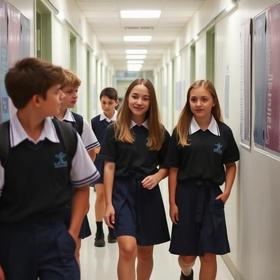When school gets back in session, parents go into a flurry of activity, transforming lethargic summer vacationers into study fiends that make the grade. Most parents know the basics of good study habits because these ideas have been drilled into them since they were sitting behind a desk in a classroom. Carve out a quiet place to study. Study at the same time every day. And so it goes.
However, recent research suggests that much of what we have been taught about developing good study habits may be flawed at best. In fact, some of those great tips might be downright inaccurate!
It appears that recent research published in the New York Times and from other learning experts may turn everything we know about effective studying topsy-turvy by introducing a whole new approach to making the grade.
Assumption #1: Find a Quiet Place to Study
Most students know they need to find a quiet place to study after school, whether it is a corner of the library or the desk in their bedroom. However, recent studies suggest that switching locations for your study session may help you retain your information more effectively.
According to a blog by Christine Carter on the Psychology Today website, "cognitive scientists believe that studying something in multiple environments increases the neural connections in our brains associated with what we are trying to learn." In plain language, more connections may mean more effective learning.
This concept was illustrated in a 1978 experiment reported recently in the New York Times, where psychologists found that students who studied a list of 40 vocabulary words in two different rooms fared better on the test than students who studied the words twice, but in the same room. Dr. Bjork, one of the psychologists who conducted the experiment, commented on his findings, "What we think is happening here is that, when the outside context is varied, the information is enriched, and this slows down forgetting." Subsequent studies have also confirmed these findings, according to the NYT.
This video offers an overview for developing better study habits.
Assumption #2: Study One Concept at a Time
Most students work with the mistaken idea that focusing on a single concept or study mode at one time will help them learn the material in question more effectively. However, this theory has also been proven inaccurate with recent studies. It turns out that incorporating a variety of study modes in a single setting will help the material sink in better. For example, someone who is studying a foreign language might include reading, speaking, and memorizing vocabulary words into a single study session.
A study published in the journal Applied Cognitive Psychology and reported by the NYT also confirms these findings. This study researched the learning habits of fourth-graders who were given math equations to learn. Half the children were taught to solve the equations using a single method, while the others were given mixed problem sets during their study session. The students with the mixed sets scored much better on a test given the following day, outscoring the other students 77% to 38%.
This video offers suggestions on how to study successfully.
The Right Study Habits
If some of our old-school thinking is wrong, then how do we help our children develop study habits that really work? Alex Ruskell, who works in academic support at Roger Williams University, offers these tips that coincide with the New York Times report on the RWU Law website:
- When studying new information, try to tie it to other things that will make it easier for you to remember (Ruskell uses the example of the sentence, "Every good boy does fine," when learning the notes on the treble staff).
- Break up studying into smaller, more manageable components (According to recent research, it might also be helpful to change the location for the different components).
- Vary the type of material studied in a single setting (Think of the foreign language session that included a variety of methods like reading, speaking, and memorizing vocabulary words.).
Also, Christine Carter talks about the importance of testing yourself on the material you are learning. Tests involve the act of recall, which alters the way we know something. Quiz younger students on math or spelling words and encourage older children to take practice tests before the real thing.
Study habits are one of the most challenging parts of the academic experience, but discarding incorrect theories we have been working with for decades and replacing them with new, more effective habits that will provide the best results. With sound habits firmly under your belt, you or your kids will be much better prepared to succeed in all of your academic ventures.
Questions? Contact us on Facebook @publicschoolreview















